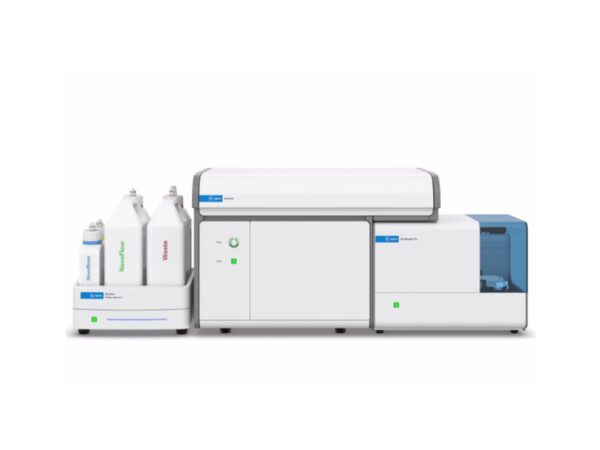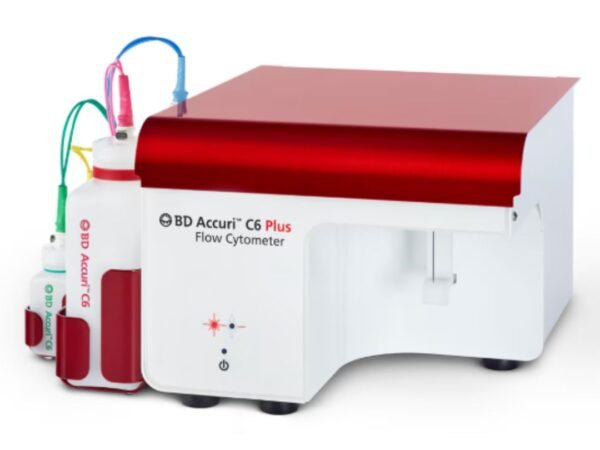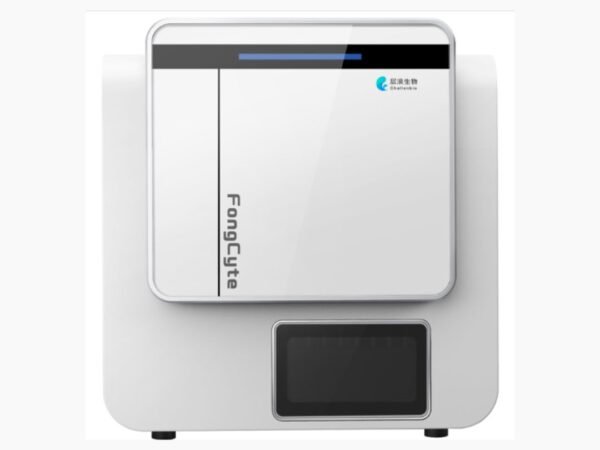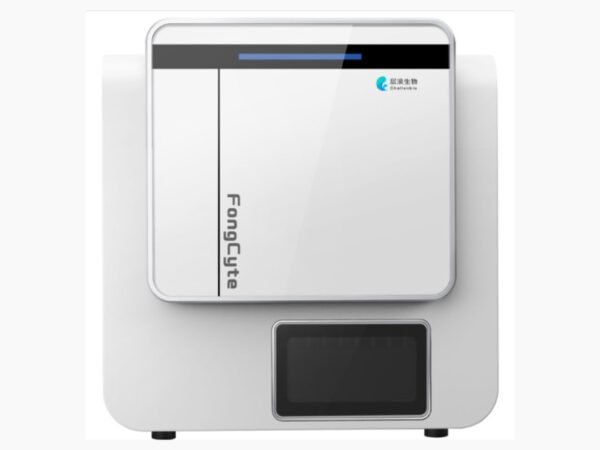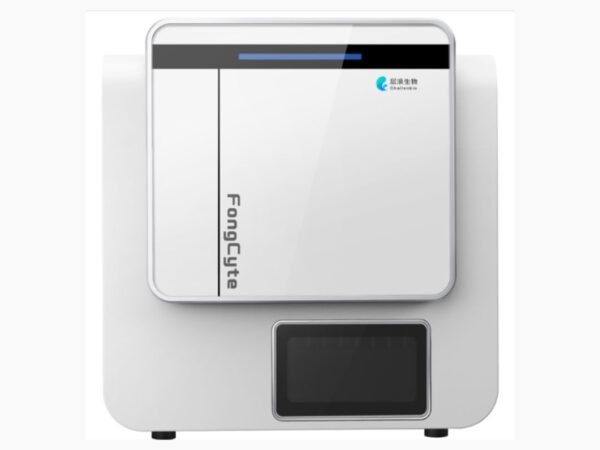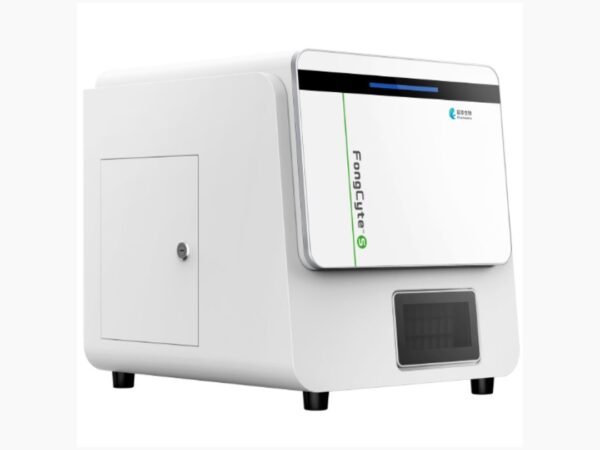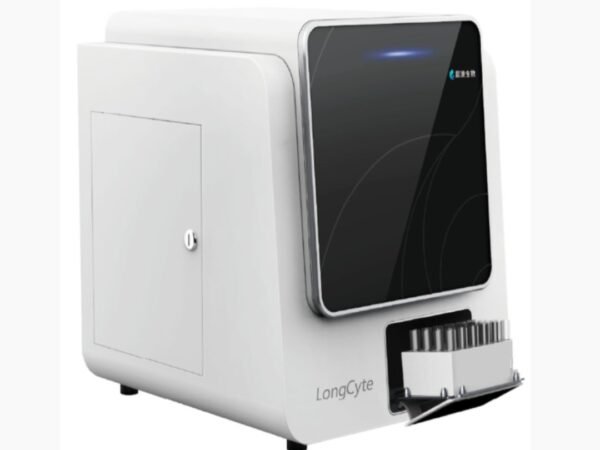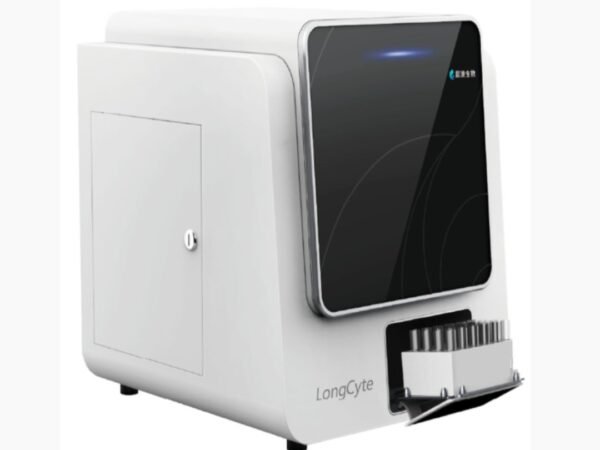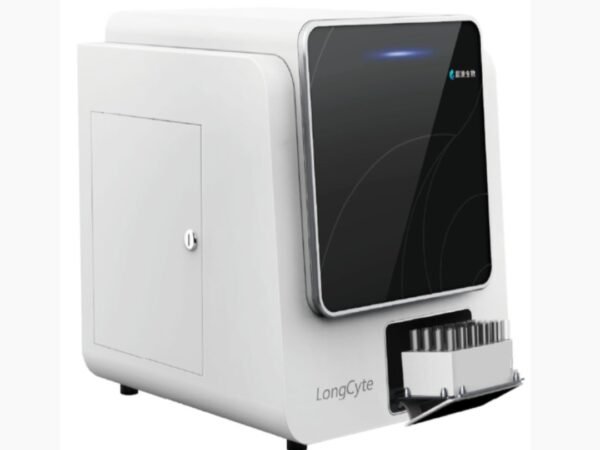Flow Cytometer
Flow cytometers are powerful, precision-engineered instruments designed to analyze populations of cells and particles with unmatched accuracy through advanced laser-based fluorescence detection. In these systems, particles are suspended in a stream of fluid and guided in a single file through highly sensitive detectors, ensuring that each one is individually examined for its unique characteristics. Fluorescent markers, such as specifically conjugated antibodies, enable the detailed identification and quantification of cellular properties, leading to the widespread adoption of flow cytometers in basic and clinical research.read more
Essential Features
- The flow cytometry equipment employs advanced technology with up to five lasers and 64 fluorescence detectors to enable high-dimensional cell sorting, offering flexible options from multiple tube sizes to index sorting into 96- or 384-well plates for deeper exploration of biological samples.
- The system streamlines every stage of flow cytometry with full workflow automation, from sample processing and compensation to acquisition and analysis, ensuring consistent, reproducible results; enables seamless assay transfer for standardized, comparable data across instruments and sites; and meets regulatory requirements with 21 CFR Part 11-compliant software featuring user management, electronic signatures, automatic analysis reports, and time-stamped audit trails.
- The high-performance, budget-friendly benchtop flow cytometer is designed for all user levels and laboratory types, offering enhanced sensitivity and resolution to detect up to 17 parameters.
- Powered by advanced microchip technology, the cell sorter eliminates cell exposure to electrical charges, decompression, and conventional fluidics. Sorting takes place within a sterile, single-use, closed cartridge, ensuring maximum safety for both samples and operators.
Applications
- Cell and gene therapy analytics: The flow cytometry instrument is ideal for scalable, standardized, and regulatory-compliant flow cytometry assays, making it particularly valuable for cell and gene therapy analytics while supporting a wide range of other research and manufacturing applications.
- Nanoparticle and extracellular vesicle research: The nano flow cytometer machine is designed for high-sensitivity analysis of nanoparticles and extracellular vesicles as small as 40 nm, offering up to six fluorescent and five side scatter channels for comprehensive characterization, making it an essential tool for advancing nanoparticle and EV research. · Immunophenotyping: Flow cytometers are widely used to identify and classify immune cell populations based on surface and intracellular markers.
- Cell cycle analysis: They help determine the distribution of cells across different phases of the cell cycle, aiding studies of proliferation and apoptosis.
- Minimal residual disease (MRD) detection: Highly sensitive flow cytometry enables the detection of small populations of abnormal cells in hematological malignancies.
- Stem cell research: They are employed to isolate and characterize stem cells by identifying specific surface markers.
- Microbiology and infectious disease: Flow cytometers allow rapid detection, enumeration, and characterization of bacteria, viruses, and parasites.
- Functional assays: Applications include measurement of cytokine production, enzyme activity, and cell signaling pathways.
- Rare event detection: They provide high sensitivity for identifying circulating tumor cells, fetal cells, or other rare populations in blood.
- Apoptosis and cell death studies: Flow cytometry enables the detection of apoptotic and necrotic cells using dyes and marker assays.
- Drug discovery and screening: They are used in high-throughput screening to assess drug effects on cell viability, proliferation, and signaling.
Showing 1–12 of 92 results
Category
- Bioreactors+
- Parallel Bioreactors
- Single-Use Bioreactors
- Stirred-Tank Bioreactors
- Capillary Electrophoresis Instruments+
- Capillary Gel Electrophoresis (CGE)
- Capillary Isoelectric Focusing (CIEF)
- Capillary Zone Electrophoresis (CZE)
- Cell Counters and Analyzers+
- Automated Cell Counters
- Manual Cell Counters
- Cellular Imaging Systems+
- Fluorescence Imaging Systems
- High-Content Imaging Systems
- Live-Cell Imaging Systems
- Centrifuges+
- Benchtop Centrifuges
- Clinical Centrifuges
- Micro Centrifuges
- Refrigerated Centrifuges
- Ultracentrifuges
- Chromatography Instruments+
- Gas Chromatography
- Ion Chromatography
- Liquid Chromatography
- Flow Cytometer+
- Cell Analyzers
- Cell Isolation Systems
- Cell Sorters
- High-Throughput Flow Cytometers
- Imaging Flow Cytometry
- Personal Flow Cytometers
- Portable/Benchtop Flow Cytometers
- Spectral Flow Cytometers
- Laboratory Incubators+
- CO2 Incubators
- Dry Bath Incubators
- Hypoxia Incubators and Chambers
- Incubator Shakers
- Laboratory Ovens
- Portable Incubators
- Thermal Mixers
- Laboratory Microscopes+
- Atomic Force Microscopes (AFM)
- Automated Modular Microscopes
- Compound Microscopes
- Confocal Microscopes
- Digital Microscopes
- Fluorescence Microscopes
- Inverted Microscopes
- Live Cell Imaging Microscopes
- Metallurgical Microscopes
- Multiphoton Microscopes
- Polarizing Microscopes
- Raman Microscopes
- Scanning Electron Microscopes (SEM)
- Stereo Microscopes
- Super-Resolution Microscopes
- Transmission Electron Microscopes (TEM)
- Upright Microscopes (Neuroscience)
- Liquid Handlers+
- Automated Pipetting Systems
- Multi-Channel Liquid Handlers
- Robotic Liquid Handlers
- Variable Volume Pipetting Systems
- Mass Spectrometers+
- Ambient Ionization
- APCI MS
- ESI MS
- FT ICR MS
- ICP MS
- Orbi Trap MS
- Quadrupole MS
- Time-of-Flight MS
- Microarray Scanners+
- DNA Microarray Scanners
- Laser-Based Microarray Scanners
- Microplate Readers+
- Absorbance Microplate Readers
- Fluorescence Microplate Readers
- Luminescence Microplate Readers
- Multimode Microplate Readers
- Particle Counters and Analyzers+
- Airborne Particle Counters
- Laser Diffraction Analyzers
- Liquid Particle Counters
- Nanoparticle Analyzers
- Portable Particle Counters
- Remote Particle Counters
Brand
- ACCU-SCOPE
- Agilent
- Airmodus
- Alphasense
- Analytik Jena
- ARGO-HYTOS
- Arrayit
- Aurora Biomed Inc.
- Azure Biosystems
- Baker
- BD Biosciences
- Beckman Coulter
- Beijing Challen Biotechnology
- Binder
- Bio-Techne
- Biobase
- BioRad
- BMG Labtech
- Bruker
- Celestron
- Cellbox
- Centurion Scientific Ltd
- ChemoMetec
- CleanAir
- Cleatech
- Corning
- Countstar
- CS Instruments
- CUBIC
- Cytek Biosciences
- Cytena
- Cytiva
- Data Technologies
- Descase
- Electrolab Biotech
- Eppendorf
- Euromex
- Evident
- Fermex
- Fluke
- Formulatrix
- Getinge
- Gilson
- GPC Bio
- Haier Biomedical
- Hamilton Company
- Hettich
- Hitachi High-Tech
- Hudson Robotics Inc.
- Hydro
- INFORS HT
- Innopsys
- Jasco
- Jeiotech
- JEOL
- Kanomax
- Keyence
- KNAUER
- LAB-KITS
- Labomed
- Labwit
- Leco
- Leica
- Lighthouse
- Logos Biosystems
- LOSI
- Lumex Instruments
- Luminex
- Malvern Panalytical
- Meiji Techno
- Memmert
- Merck
- Mettler-Toledo International Inc.
- Miltenyi Biotec
- Molecular Devices
- Motic
- MP Filtri
- MSE (Medical and Scientific Equipment)
- NCI
- Nikon Instruments
- NuAire
- ORFLO Technologies
- Oxford Instruments
- PAMAS
- Particle Measuring Systems
- Particles Plus
- PBS Biotech
- PCE instruments
- PerkinElmer
- PharSol
- PHCbi
- Prior Scientific
- Promega
- Qiagen NV
- Revvity
- RION
- Sartorius
- SATAKE
- Sciex
- Sebia
- SETA
- Setra
- Shimadzu
- SIBATA
- Sigma Laborzentrifugen GmbH
- Solaris Biotech
- Solida Biotech
- Sony Biotechnology Inc.
- SPT Labtech Ltd
- Stratedigm Inc.
- Sysmex Corporation
- Tecan
- TES
- Thermo Fisher Scientific
- TSI
- Waters
- Western States Machine Company
- ZEISS
- ZETRON
-
Agilent NovoCyte Advanteon Flow Cytometer Systems 1-3 Lasers
The NovoCyte Advanteon delivers high-performance, customizable flow cytometry for reliable, multiparameter cell analysis across research environments.
-
Agilent NovoCyte Flow Cytometer Systems 1-3 Lasers
Compact, customizable flow cytometer with up to 3 lasers for multiparameter analysis.
-
Agilent NovoCyte Opteon Spectral Flow Cytometer Systems 3-5 Lasers
NovoCyte Opteon systems offer high-performance spectral flow cytometry with up to five lasers, enabling advanced, multiparametric cellular analysis wi...
-
Agilent NovoCyte Penteon Flow Cytometer Systems 5 Lasers
The Agilent NovoCyte Penteon Flow Cytometer offers advanced multicolor analysis with 5 lasers and up to 30 fluorescence channels, ensuring high sensit...
-
BD Biosciences BD Accuri™ C6 Plus Personal Flow Cytometer
The BD Accuri™ C6 Plus Flow Cytometer is a compact, easy-to-use instrument designed for a wide range of research applications. It offers reliable pe...
-
Beijing Challen Biotechnology FongCyte™ 2 Laser 11 Color Flow Cytometer
Reliable instrument designed for efficient 8-color fluorescence analysis using two lasers.
-
Beijing Challen Biotechnology FongCyte™ 3-laser 14-color flow cytometer
Delivers precise fluorescence detection and high-speed data acquisition for complex samples.
-
Beijing Challen Biotechnology FongCyte™ Flow Cytometer with 561nm Laser
Ideal for basic research, the 1-laser 4-color FongCyte™ system provides foundational cytometry capabilities.
-
Beijing Challen Biotechnology FongCyte™ S 4 Laser Flow Cytometer
Engineered for high-dimensional analysis with four lasers and advanced signal resolution capabilities.
-
Beijing Challen Biotechnology LongCyte™ 1 Laser 5 Color Flow Cytometer
Compact and affordable system ideal for routine flow cytometry with essential 5-color detection.
-
Beijing Challen Biotechnology LongCyte™ 2 Laser 6-color/8-color Flow Cytometer
Designed for basic to intermediate flow cytometry needs with dual-laser capabilities and flexible color options.
-
Beijing Challen Biotechnology LongCyte™ 2-laser 11-color flow cytometer
Optimized for medium-complexity experiments, allowing robust 11-color fluorescence analysis with two lasers.


